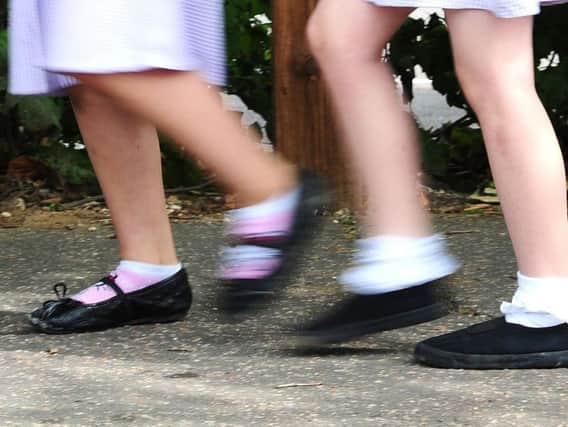Survey reveals many children lack basic skills


We don’t mean have they got a uniform or a new pencil case.
But has the typical four-year-old got the skills to communicate - or even take their own coat off?
A poll of headteachers say children are now increasingly not ready to start school when they first enter a classroom with speech and language skills among children a major concern.


Advertisement
Hide AdAdvertisement
Hide AdThe National Association of Head Teachers (NAHT), which co-commissioned the poll, said they want extra money for education, including the early years, as well as more investment in services for families.
Andy Mellor, headteacher at St Nicholas CE Primary in Marton, who is also Vice-President of the NAHT, said the rising concerns are directly linked to government cuts to early years budgets, including children’s centres – with the poorest in society being hit the hardest.
He says: “We have had examples of children not being able to take their own coat off or simply being unable to have a conversation with another child in their class. Literacy and speech is a huge concern for headteachers.
“Our job is to make sure children hit the ground running and make the most of their time in primary school.


Advertisement
Hide AdAdvertisement
Hide Ad“But our members are finding schools are having to do more work with children in reception to make good the gaps they have. We are having to do a lot more speech and language work and the cuts to support in early years is having a real effect.
“We have lost children centres across the country and we cannot underplay this impact. They used to support the most vulnerable in society.
“The work they did was about developing these skills and supporting parents who may not want to talk to a teacher about their issues. That support network is being lost and we have noticed increasingly over the last five years that schools are having to pick up the pieces. I’ve lost £20,000 from my budget for my school earmarked for speech and language. I know of one headteacher in Blackpool who is spending half of his budget on safeguarding. Can you imagine Chelsea or Manchester United spending half of their money on things other than what should be directed to them winning matches?”
Dayle Harrison, headteacher at Revoe Academy in central Blackpool, says his staff regularly have to deal with teaching even basic skills – such as toileting.


Advertisement
Hide AdAdvertisement
Hide AdRevoe has a children’s centre on site – but funding for it is constantly under review.
“We have protected funding for speech and language but to be honest with you we could spend double or treble that amount due to the level of need we have in this area.
“We have a children’s centre but funding for it in the future is not yet secure. It’s very worrying.”
What did the survey find?


The NAHT polled 780 school leaders in England, Wales and Northern Ireland.
Advertisement
Hide AdAdvertisement
Hide AdIt found 83 per cent of those questioned thought there was an issue with school readiness, and of these, 86 per cent thought the issue had worsened in the last five years.
Around a quarter (24 per cent) said that more than half of their intake was not school ready. Asked to rank the issues causing concern, children’s speech, language and communication was found to be causing greatest concern, followed by personal, social and emotional development, such as behaviour issues, and physical development.
School leaders were also asked the likely reasons why children are not school ready.
Failure to identify and support children’s additional needs was the most popular answer among those that answered the question, followed by parents having fewerresources and pressure on family life, and then reductions in local services to support families.
Can nurseries do more?


Advertisement
Hide AdAdvertisement
Hide AdMost parents in England are entitled to 30 hours a week free care for children aged three to four, helping families save up to £5,000 a year, according to the government. However, education charities warned the scheme will cause “chaos” as it is underfunded and some nurseries may be forced to close. Andy Mellor says: “Nurseries are having to raise fees to make sure they can afford it. If parents can’t afford those fees they will simply drop out and may not know how to get support elsewhere.” Half of nurseries in a recent poll said they will increase charges for products such as children’s meals, nappies and trips to cover the cost of delivering the 30-hour free childcare places.
What does the Government say?
Education Secretary Justine Greening announced an extra £1.3 billion for schools over the next two years.
A Government spokeswoman said: “The gap between disadvantaged children and others achieving a good level of development has narrowed since 2013.
“The Government’s historic four year funding settlement provides councils with £200 billion to help them fund all local services as well as more than £16 billion in local government public health services so they can deliver the services their communities need.”
Advertisement
Hide AdAdvertisement
Hide AdLabour’s early years spokeswoman Tracy Brabin said the report “should make sobering reading for Tory ministers”.
“It is yet more evidence of a problem that has worsened on their watch,” she said.
“It is now incumbent on the Government to ensure their spending on childcare goes towards high-quality early years education, supporting children to get the best start in life.”
Isn’t a lot of it down to lazy parenting?
Critics could argue it is surely up to parents or guardians to develop and prepare their children for school without the comfort blanket of the state.
Advertisement
Hide AdAdvertisement
Hide AdToo much ‘screen time’ playing games and watching videos on mobile phones and child iPads is feared to be a major factor in the decline in the ability of young children to talk effectively or hold a conversation.
So if parents take more responsibility, surely it will improve, right?
“Our survey is not telling us that,” argues Andy.
“It is the cuts to councils up and down the country that is the major factor and the time pressures parents are facing.
“In Oxford for example both parents may have to work long hours because of the property prices. But in Blackpool both parents have to work just to make ends meet.
Advertisement
Hide AdAdvertisement
Hide Ad“But as a parent myself I am acutely aware that allowing children to use a phone or a tablet occupies time and perhaps gives a parent respite.
“If you give a child pen and pencil they may draw a picture and therefore develop these skills. But with an iPad we as parents may be oblivious to it. Of course if children are spending all day in front of a screen you may lose that successful development of language skills.”
Dayle says the focus needs to be on educating parents to help them pass on the skills to their own children.
“We don’t want to damn parents but upskill them, which is a priority.
Advertisement
Hide AdAdvertisement
Hide Ad“They may not have had the skills passed to them by their own parents so it is a spiral effect. It is not uncommon that when we do home visits there is not a book in the house. The parents may be talking and the TV is blaring in the background.
“I share the concerns that too much technology is making children increasingly unable to communicate, develop language or even make eye contact. It has been known for a two-year-old to be able to work a smartphone.”